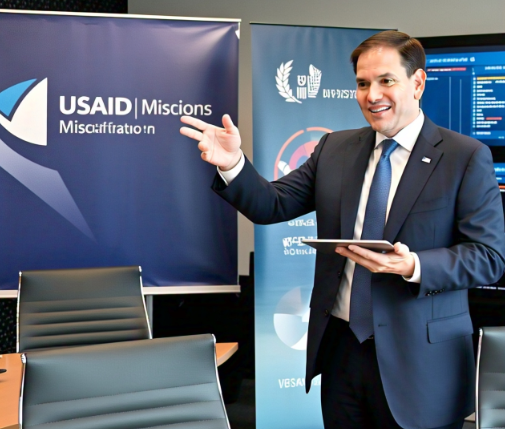Marco Rubio USAID Role in the Dismantling You Need to Know

Marco Rubio USAID Role in the Dismantling You Need to Know
Introduction
Significant changes have occurred in U.S. foreign policy in recent years, especially in relation to international aid initiatives. The reorganization of the U.S. Agency for International Development (USAID), spearheaded by Senator Marco Rubio of Florida, was among the most noteworthy actions. However, how does this decision affect U.S. foreign aid, and what role is Rubio playing in USAID’s dismantling? Rubio’s involvement in the reform, the restructuring’s wider ramifications, and the consequences for future U.S. foreign policy are all examined in this article.
Marco Rubio and the USAID Overhaul
Known for his conservative foreign policy views, Senator Marco Rubio has been instrumental in changing U.S. foreign aid initiatives, especially through USAID. Under the Trump administration, Rubio assumed a leadership position as USAID’s acting administrator at the beginning of 2025. A significant reorganization was prompted by his monitoring in order to better align international aid with the national interests of the United States.
What Is USAID, and Why Is It Important?
Since its founding in 1961, USAID has been a pillar of US international assistance. It is in charge of providing economic help, technical assistance, and humanitarian aid to nations in need as well as development assistance. Promoting democracy, advancing global stability, and reducing poverty have long been the objectives of USAID.
However, Rubio oversaw a significant transformation of the organization. In the end, his administration’s thorough evaluation of USAID’s operations resulted in the cancellation of around 83% of its projects. To improve efficiency and streamline operations, the remaining programs were incorporated into the State Department.
Why Did Marco Rubio Push for USAID’s Restructuring?
Rubio highlighted economic efficiency and national security as justifications for eliminating and reorganizing USAID. He maintained that a large number of USAID initiatives had failed to advance the fundamental interests of the United States and had, in certain situations, even undermined the nation’s foreign policy goals. Rubio claimed that tens of billions of dollars were being spent by the US on initiatives that were out of step with national priorities.
To “align foreign aid with national interests,” as Rubio put it, these changes were required, underscoring the need for a more targeted approach to U.S. aid and diplomacy.
The Legal and Political Controversy Marco Rubio USAID
The restructure caused a great deal of political and legal debate, despite Rubio and the Trump administration’s defense of it. The drastic changes, according to critics, would harm humanitarian efforts and global growth. A federal judge also decided that President Trump had overreached himself by terminating the majority of USAID’s projects without the consent of Congress. This decision made it clear that the legislative branch must be consulted before making any major adjustments to U.S. foreign aid policy.
Rubio maintained his stance in the face of legal challenges, arguing that the cuts were required to bring U.S. foreign aid into line with more general strategic goals.
Impact on U.S. Foreign Aid and Global Stability
The future of U.S. foreign aid has come under scrutiny due to USAID’s restructuring. Critics fear that cutting off vital development initiatives will jeopardize international stability, particularly in areas where the United States has traditionally supported democratic governance and economic progress.
However, proponents of the restructuring contend that the reorganization will enable a more effective use of taxpayer funds and that U.S. foreign aid should be more closely aligned with national interests.
What’s Next for Marco Rubio USAID?
The future of USAID is still up in the air. The State Department’s move toward a more centralized administration structure may result in additional adjustments to the allocation of U.S. foreign aid. Advocates and critics will keep an eye on how these changes impact international humanitarian efforts, especially in nations that depend on US aid for disaster relief and development.
Conclusion
The way the United States oversees its overseas aid initiatives has changed significantly as a result of Marco Rubio’s involvement in the dissolution. Both resistance and support have been generated by his attempts to realign the agency with American national interests, which raise significant issues regarding the direction of American foreign policy as we advance. Rubio’s impact on the course of U.S. aid will surely continue to be a crucial topic of discussion in the upcoming years as legal disputes continue and the effects of these changes become more evident.